Text
The Perils of #CancelCulture: Celebrities vs Normals
Social media provides a great medium for instantly expressing thoughts and reactions, however, the practice of online shaming or cancel culture has become prevalent. The victims of cancel culture can be successful celebrities or normal individuals whose transgressions become public, however, the consequences of being publicly shamed are overwhelming devasting for ordinary individuals, while celebrities can use privilege to overcome ‘cancelling’.

The act of publicly shaming is not new and has a long dark history, arguably social media amplifies consequences for individuals, “shaming in digital times needs to be understood in terms of the continuum of this practice where the media now hold the power to impose a ‘digital mark of shame’ that is symbolic and lasting” (Hess & Waller, 2013, p. 101). The recent flurry in public shaming of celebrities, for a variety of indiscretions, has shown how easily they can be redeemed. For example, the hugely successful beauty influencer James Charles, that after being ‘exposed’ by fellow influencer and former friend Tati Westbrook received backlash across the internet; “…lost about three million followers on YouTube; Miley Cyrus, Shawn Mendes and Kylie Jenner have all unfollowed him on Instagram.” (Safronova, 2019). The internet moves quickly and shortly after posting a second apology video where he defended himself, his follower count started improving and currently stands at 15 million. While the negative attention that Charles received from across the internet was significant and damaging to the 19-year-old, his career or finances are not permanently affected. The ability of celebrities to recover from public shaming depends on the severity of transgression but crucially the amount of influence and media savviness they can wield, “Which is to say, the canceled can be uncanceled — if they’re willing to do the work. Or hire a good publicist” (Bromwich, 2018).
The path to public redemption is often not clear for ordinary individuals after facing public shaming, take the example of ‘Permit Patty’. Online outrage ensued, after a video was posted on Twitter of Alison Ettel calling the police on a child selling water on the street for an apparently not possessing a permit. The internet quickly found her personal information and she swiftly received a barrage of online abuse and death threats (Molloy, 2018), eventually having to resign from her company (Levin, 2018). Cases such as Ettel are common, with many reasons for outrage from accusations of racism, such as Justine Sacco as demonstrated in a fellow student blog. There are also more simple grievances of lawsuits, shown by New York Times Retro report.
youtube
These instances of online outrage to shamed individuals highlight how ‘mob mentality’ is easily created on social media platforms, “online harassment can quickly become a team sport, with posters trying to outdo each other … An accurate name for such online groups is cyber mobs” (Citron, 2014). However, these instances of shaming where the internet form a ‘mob’ to enact some form of justice, even when the offence committed are atrocious, the consequences can be everlasting with no rehabilitation offered. Expect in the cases of celebrities, which demonstrates how internet justices and mobs can be imperfect and unfair with punishments.
References
Bromwich, J. E. (2018, June 28). Everyone Is Canceled . Retrieved from The New York Times: https://www.nytimes.com/2018/06/28/style/is-it-canceled.html
Citron, D. K. (2014). Hate Crimes in Cyberspace. Harvard University Press.
Hess, K., & Waller, L. (2013). The digital pillory: media shaming of 'ordinary' people for minor crimes. Journal of Media & Cultural Studies, 28(1), 101-111. doi: https://doi.org/10.1080/10304312.2013.854868
Levin, S. (2018, June 27). 'Permit Patty': A women who threatened black girl with police resigns from cannabis firm. Retrieved from The Guardian: https://www.theguardian.com/us-news/2018/jun/26/permit-patty-san-francisco-police-black-girl-selling-water
Maidlow, H. (2019). Internet Shaming: You are what you tweet [Blog]. Retrieved from https://helenamaidlow.tumblr.com/
Molloy, M. (2018, June 25). Online shaming: The dangerous rise of the internet pitchfork mob. Retrieved from The Telegraph : https://www.telegraph.co.uk/news/2018/06/25/online-shaming-dangerous-rise-internet-pitchfork-mob/
Safronova, V. (2019, May 14). James Charles, From 'CoverBoy' to Canceled . Retrieved from The New York Times: https://www.nytimes.com/2019/05/14/style/james-charles-makeup-artist-youtube.html
0 notes
Text
Political campaigning in the 21st Century
In the UK recent campaign periods have arguably been tumultuous with controversial decisions being reached by the electorate, most vividly the 2016 referendum. The following General Election in 2017, was also surprising with an apparently unpopular Labour party and Corbyn also gaining more parliamentary seats than expected, although not winning a majority.
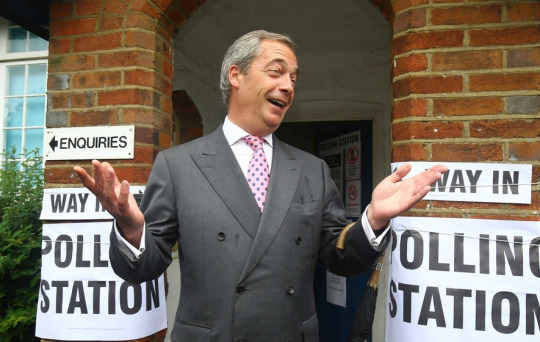
The connecting factor in both of these election results is the rise of digital campaigning, it commonplace for social media channels to be littered with campaign materials during election periods. Arguably, campaign efforts need to feature a range of methods to be successful in a hybrid media system (Chadwick, 2017), “Campaigns now rely on a combination of digital media, television, and particular formations of physical space … rallies, marches, town hall meetings, and staged campaign gatherings” (p.254). As such, we the electorate have been privy to a variety of tactics to create and maintain support for a campaign.
The ‘Leave vs Remain’ 2016 referendum was unique in that crossed traditional party boundaries and activated a range of supporters across the country. The following 51.9% ‘Leave’ decision reached also surprised the media and pollsters, “It wasn’t just a bad night … for pollsters, who misread the mood of the electorate in the run-up to the vote” (Duncan, 2016). Retrospectively, the Leave campaign was superior in many aspects, “the activation of a greater number of Leave supporters at grassroots level and enabled them to fully dominate platforms like Facebook, Twitter and Instagram, influencing swathes of undecided voters who simply didn’t know what to think.” (Polonski, 2016). This strong online presence with a clear and emotional message from official campaign pages and Leave supporters, was also coupled with physical events. For instance, the now infamous ‘£350 million bus a week for the NHS advert which was widely shared on social media channels and traditional media, ‘£350 million a week’ was probably one of the most effective and important slogans of the 2016 referendum campaign’ (Farrell & Goldsmith, 2017). As such, the Leave campaign was successful in transmitting their message and efficiently persuaded voters in a way that pollsters could not predict.
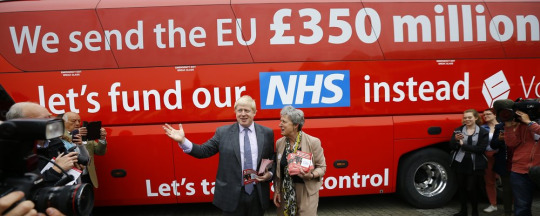
Aspects of the ‘Leave’ campaign were also used by 2017 Labour campaign, that although didn’t win also thoroughly surprised political establishment by gaining parliamentary seats. The Labour campaign successfully targeted the hybrid media system, creating a compelling message that overwhelming persuaded younger voters (Gerbaudo, 2019). The emergence of a new campaign group which strongly support Corbyn, Momentum also has assisted in creating support for Jeremy Corbyn. The grassroots group have managed to continue online support for Labour while also being regularly featured in traditional news publications and TV due to its passionate message which has resonated again with younger supporters. Momentum also consistently organise demonstrations and create videos attacking the Tory party, again creating media interest.

Overall, political campaigning in the 21st century is a complicated and delicate process, to be successful in the hybrid media system political parties need to understand and impact different mediums, simply being successful in social media or TV is not sufficient.
References
Chadwick, A. (2017). The Hybrid Media System Politics and Power (Second ed.). New York: Oxford University Press.
Duncan, P. (2016, June 24). How the pollsters got it wrong on the EU referendum. Retrieved from The Guardian: https://www.theguardian.com/politics/2016/jun/24/how-eu-referendum-pollsters-wrong-opinion-predict-close
Farrell, J., & Goldsmith, P. (2017). How to lose a referendum : the definitive story of why the UK voted for Brexit. London: Biteback Publishing .
Gerbaudo, P. (2019). The Digital Party: Political organisation and online democracy . London: Pluto Press.
Polonski, V. (2016). Impact of social media on the outcome of the EU referendum. Retrieved from EU Referendum Analysis 2016: Media, Voters and the Campaign: http://www.referendumanalysis.eu/eu-referendum-analysis-2016/section-7-social-media/impact-of-social-media-on-the-outcome-of-the-eu-referendum/
0 notes
Text
A look back at the Arab Spring: Online Revolution
A 2011 BBC documentary highlighted the tumultuous unrest in the Arab countries as citizens in several Arab countries such as Egypt, Tunisia and Syria often protested with the help of social media platforms against dictators and corrupt governments. As social media has continued to develop since the Arab Spring, it seems the facilitating nature of social media still assisting political revolution across the world.

The origins of the Arab Spring are complex to understand due to these Arab countries’ issues being interweaved with historical, religious and global economic events and beliefs. However, it can be assumed that essentially the ordinary citizens were angry and worn-out by the corruption and social injustices they faced daily. Unfortunately, citizens still find themselves in the same situation. For instance, Sudan, who is recently experiencing a wave of civilian protest, the specific circumstances are explained in a fellow student blog here. In the same manner that social media impacted dissemination and organisation of physical protest in the 2011 Arab Spring, Sudan also benefited. A clear signal of the importance of social media is the Sudanese government restricting access to social media, “Sudanese authorities are blocking access to popular social media platforms used to organize and broadcast nationwide anti-government protests” (Saba & Nafisa, 2019)
The same conditions in which the 2011 Arab Spring occurred are still relevant to some extent, such as the comparatively lower internet penetration. For instance, Syria only has 30% internet penetration (Statista, 2018). However, this did not prevent social media influencing in several ways at every stage of unrest in participating Arab Spring countries. The benefits of social media particularly in a civil protest such as the Arab Spring, are noted by Shirky (2011), “the potential of social media lies mainly in their support of civil society and the public sphere”.
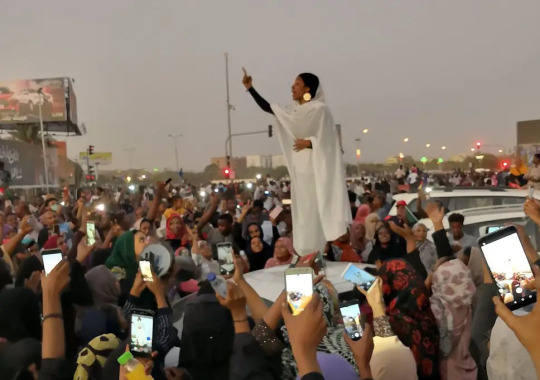
The documentary also showed how dictators, for example, in Tunisia relied on protests being squashed and not influencing other citizens, as such, traditional journalism such as TV was prevented from reporting early protests. Crucially this is where social media played a role, “the development of social media came at the right historical moment and served as a catalyst in the midst of the social struggle.” (Miladi, 2016, p. 37). For instance, protesters filmed demonstrations and the treatment they received from police. These videos and status were quickly shared to other citizens which fueled anger and discontent but also allowed for larger news corporations to also share to the rest of the world the political unrest.
The importance of social media in the Arab Spring was further emphasised by the ruling governments, in attempting to ‘shut down the internet’ on several occasions to prevent protest in Egypt and Syria. However, this had a limited effect as the foundations for unrest was set, with one protester explaining that Facebook acted as a public brainstorm for protest in Syria.
In my opinion, I do believe that social media, in particular, had a crucial role in the Arab Spring, without social media, the sharing of information the organisation of protests could have arguably been limited. However, it also vital to not overestimate the role of social media in the Arab Springs or to use Arab Spring social media use a framework for future protests. As the properties of social media can be used for civic good but also cause civic harm, as Shirky (2011) claims social media is “just as likely to strengthen authoritarian regimes as it is to weaken them”.
References
Gore, S. (2019). The role of the Internet in the Sudanese revolution [Blog]. Retrieved from https://shivanigore.tumblr.com/
Miladi, N. (2016). Social Media and Social Change. Digest of Middle East Studies .
Saba, Y., & Nafisa, E. (2019, January 2). Sudan restricts social media access to counter protest movement . Retrieved from Reuters: https://www.reuters.com/article/us-sudan-protests-internet/sudan-restricts-social-media-access-to-counter-protest-movement-idUSKCN1OW0Z7
Shirky, C. (2011). The Political Power of Social Media: Technology, The Public Sphere, and Political Change. Foreign Affairs.
Statista . (2018, January ). Active social media penetration in Middle East & North African countries in January 2018. Retrieved from Statista: https://www.statista.com/statistics/309668/active-social-media-penetration-in-arab-countries/
How Facebook Changed the World: The Arab Spring, 02:00 22/06/2001, Peak 107FM; Radio Victory, 240 mins. https://learningonscreen.ac.uk/ondemand/index.php/prog/01F3ED1B?bcast=70067 (Accessed 24 May 2019)
0 notes
Text
The Rise of Anti-Vaxxers
Vaccinations are one of the greatest achievements in the fields of medicine and science, with the NHS describing vaccines as “…one of the greatest breakthroughs in modern medicine. No other medical intervention has done more to save lives and improve quality of life.” (How vaccination saves lives, 2016). In spite of this, there has been a recent movement which directly opposes vaccines, often the umbrella of ‘anti-vaxxers’. Individuals from the anti-vaxxer movement oppose vaccinations for a variety of reasons and interestingly use social media, blogs and forums to spread and create support for their views. To some extent, the anti-vax movement has had success with a recent drop in immunisation rates across many countries. For instance, the MMR vaccine coverage in England “decreased in 2017-18 for the fourth year in a row. Coverage for this vaccine is now at 91.2%, the lowest it has been since 2011-12. (Government Statistical Service, 2018).

Of course, the anti-vax movement cannot be credited to all drops in immunisations rates, however, they have created a strong online presence, an example being ‘mummy’ blogs and forums. A 2011 study into the online anti-vax community overviewed the common tactics of these blogs, such as mothering.com and the UK equivalent Mumsnet.com. Kata, (2011) uncovered that these blogs and activists use four main tactics; skewing the science, shifting hypotheses, censorship and attacking the opposition.
One of the greatest benefits of the digital age is the amount of data that can be accessed by anybody. The anti-vax community use and distort scientific evidence and data for their benefit, “greater access to scientific information, but when combined with postmodern notions of relativism and questioning expertise, research can be reinterpreted in various ways to support specific ideologies” (Kata, 2011, p. 3782). An example of distorting facts is the anti-vax notion of ‘toxins’ and an apparent lack of reliability of vaccines, a common trope used by activists. This often discounts the complexities of vaccines, that probably can only be explained by medical professionals. Nevertheless, they can have a severe impact on anxious parents who told on social media about, “a shadowy medical establishment” (Hinsliff, 2019) and instead told to trust their own ‘parental instincts’.
These notions of questioning ‘elites’ and framing medical decisions as purely personal are prevalent within the online community of anti-vaxxers, “Bloggers whose posts were characterized as strongly vaccine-discouraging tended to frame the issue of vaccination as one of individual liberty and a private family matter” (Meleo-Erwin, Basch, MacLean, Scheibner, & Cadorett, 2017, p. 1898). Crucially, however, immunisation and vaccines are renowned for not being individual choices, herd immunity is vital in modern society and can have real-life effects across all of society.
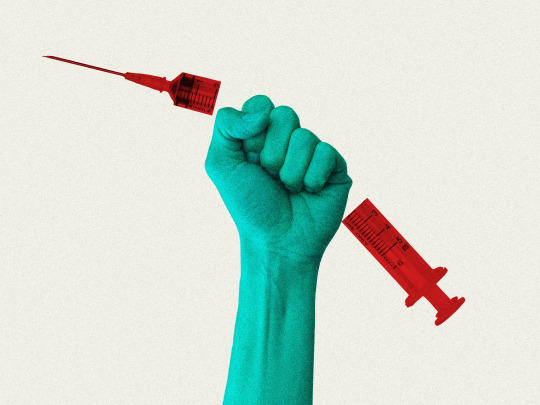
These post-modern ideas of personal choice coupled with a growing distrust of institutions have formed the perfect conditions for the growth of anti-vaxxers, digital methods such as forums, social media and blogs have also provided the perfect distribution for such ideas. It is important to emphasise though, that anti-vaxxers are a small movement with most parents making sensible medical decisions for their families. The anti-vax movement does highlight, however, a concerning trend of distrust for institutions. As a society we have access to high levels of information, what is vital is how that information is used.
References
Government Statistical Service. (2018). Childhood Vaccination Coverage Statistics, England, 2017-18. NHS Digital.
Hinsliff, G. (2019, April 27). Anti-vaxxers are taking populism to a new, deadly level. Retrieved from The Guardian: https://www.theguardian.com/commentisfree/2019/apr/27/vaccines-mmr-fears-anti-vaxxers
How vaccination saves lives. (2016). Retrieved from NHS: https://www.nhs.uk/conditions/vaccinations/vaccination-saves-lives/
Kata, A. (2011). Anti-vaccine activists, Web 2.0, and the postmodern paradigm – An overview of the tactics and tropes used online by the anti-vaccination movement. Vaccine, 30, 3778-3789.
Meleo-Erwin, Z., Basch, C., MacLean, S. A., Scheibner, C., & Cadorett, V. (2017). “To each his own”: Discussions of vaccine decisionmaking in top parenting blogs. Human Vaccines & Immunotherapeutics, 13(8), 1895-1901. doi:10.1080/21645515.2017.1321182
0 notes
Text
Politicians and Social Media: Use with caution
Undoubtedly for politicians to reach electoral success they need to portray themselves positively, as Langer (2011) explains “If leaders are to represent us, citizens need to think and feel that they are not only authoritative and capable persons but also attractive objects of identification and personal trust” (p.46). To achieve this before social media politicians normally replied on physically meeting the electorate, TV appearances and newspaper portrayals to showcase their personality and leadership skills.
While all these traditional methods of self-promotion are essential, social media can be a great tool and if used correctly can create positive engagement between politicians and their voters. However, these social media platforms such as Twitter and Facebook are unpredictable, and politicians’ online efforts can be ‘remixed’ or misinterpreted by users, often to the embarrassment of senior politicians.
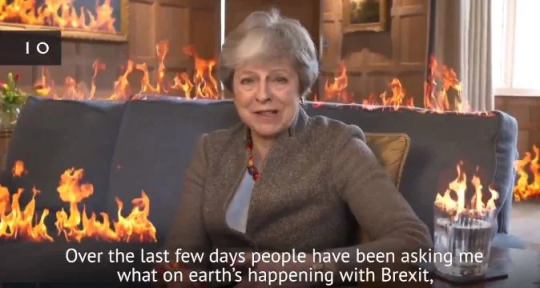
One of the most prominent examples of politicians use of social media is President Donald Trump. His frequent use of Twitter defies all political conventions of social media use, such as spelling mistakes and insulting foreign political leaders.
For instance, President Trump berated Mayor Khan following London Bridge attack, with him tweeting “At least 7 dead and 48 wounded in terror attack and Mayor of London says there is "no reason to be alarmed!" (@realDonaldTrump, 2017). While his tweets regularly draw criticism from the political establishment, they also, receive praise from Trump base supporters. As Theye & Melling (2018) state, “His willingness to tear down people and institutions using aggressive and insulting language, rather than the typical equivocating style of traditional politicians affirm his outsider status to voters who also feel like outsiders.” (p.329). Donald Trump social media use seems to be encouraging his base supporters but also is frequently used to undermine his presidential abilities by opponents
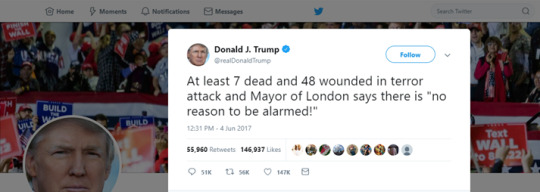
While it can be debated that Donald Trump strategically uses his Twitter account for political gain, there are some humorous examples where a politician intended messaged is changed by social media users. For instance, back when David Cameron was Prime Minister in 2014, he tweeted a picture of himself on the phone to President Obama regarding issues with Russia. The reaction by the Twitter community was certainly not expected by number 10 media team. There were numerous memes and captions created from the image, with even celebrities such as Patrick Stewart posting a version of the image.
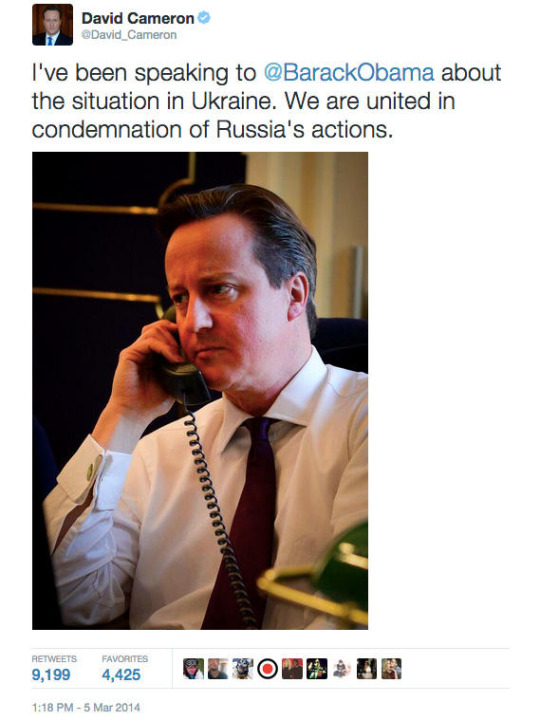
These types of social media viral events can be viewed to be positive for politicians’ public profile, as it can on some occasions show the ‘human’ or funny side of politicians, “Leaders can use, and politicise, the personal and emphasise the ‘human’ aspects of their personae…” (Langer, 2011, p.52). However, it is difficult to determine if these humorous events on Twitter create a better ‘human’ view of politicians or instead undermines their leadership. As often social media reactions such as the Cameron phone meme were not the original intention of leaders and invite ridicule instead of respect from citizens.

It is clear that social media can be a useful tool for disrupting information and creating positive involvement and understanding between politicians and citizens. The unpredictable and interpretive nature of social media, however, means that it is harder to portray the ‘image’ they desire on social media.
References
@David_Cameron. (5th, March, 2014). “ I've been speaking to @BarackObama about the situation in Ukraine. We are united in condemnation of Russia's actions”. (Twitter Post). Retrieved from https://twitter.com/david_cameron/status/441306815733579776?lang=en
Langer, A. I. (2011). The Personalisation of politics in the UK, Mediated leadership from Atlee to Cameron. Manchester: Manchester University Press.
Theye, K., & Melling, S. (2018). Total Losers and Bad Hombres: The Political Incorrectness and Perceived Authenticity of Donald J. Trump. Southern Communication Journal.
@realDonaldTrump. (4th, June 2017). “At least 7 dead and 48 wounded in terror attack and Mayor of London says there is "no reason to be alarmed!" (Twitter Post). Retrieved from https://twitter.com/realDonaldTrump/status/871328428963901440
1 note
·
View note